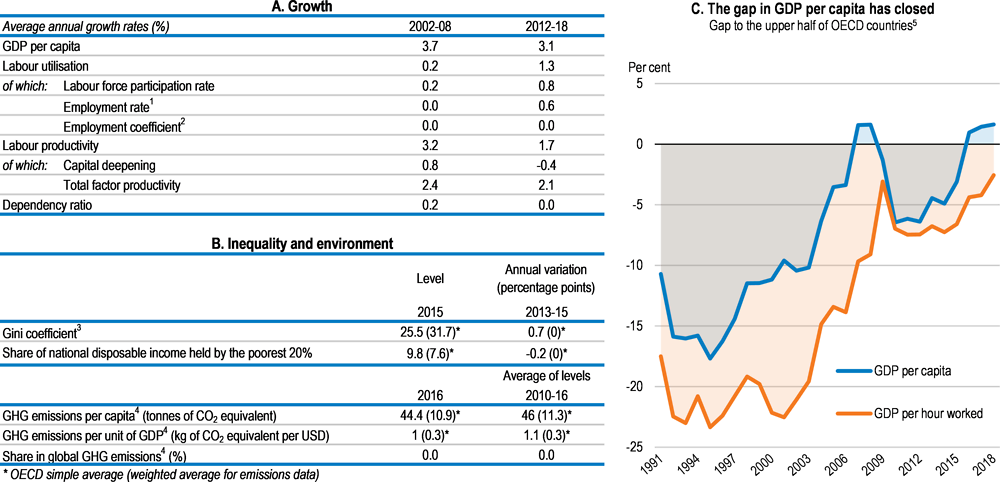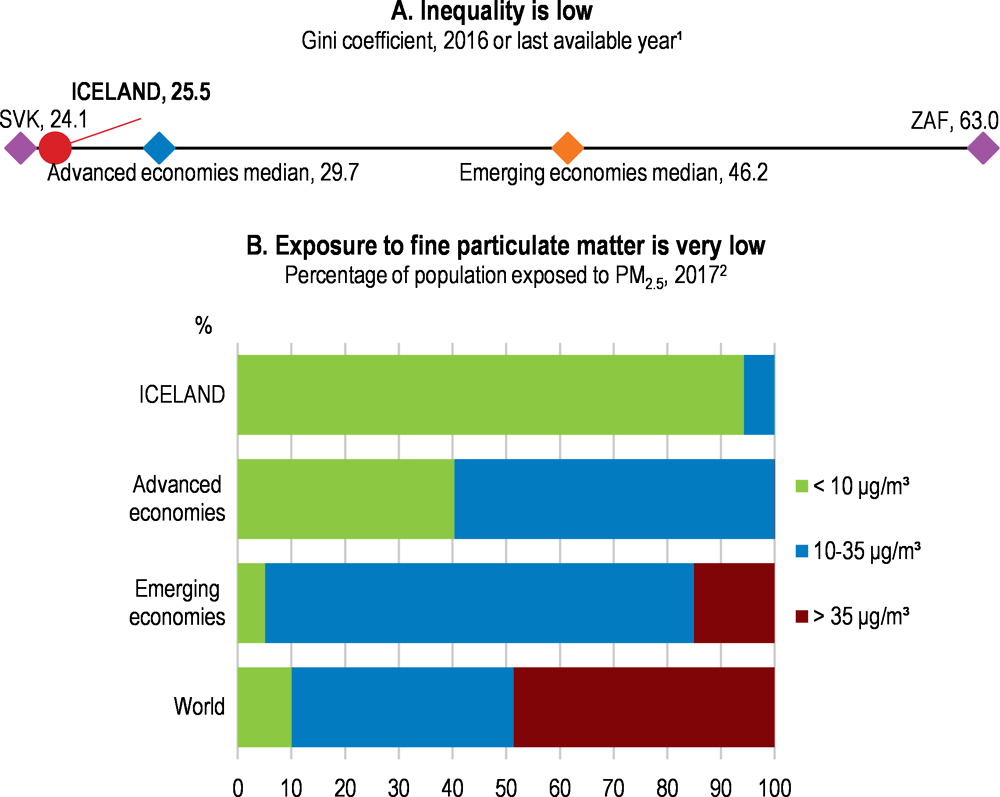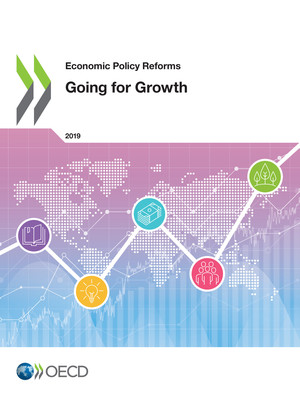copy the linklink copied!Iceland
GDP per capita is among the highest in the OECD, having recently surpassed pre-crisis levels. Growth has been driven by high employment growth and increasing labour force participation, while labour productivity is lagging and competitiveness is declining.
Inequality is among the lowest in the OECD and it has declined since the crisis as the income share of high-income households fell sharply. The gender gap is the lowest in the OECD. The natural environment provides plenty of renewable energy and spectacular tourist attractions. However, tourism is putting pressure on the environment. Pollution and greenhouse gas emissions per capita from transport are among the highest in the OECD.
The 2017 Going for Growth priority to strengthen the competition regime has been addressed partly and the remaining reform recommendations are now included in the priority to support entrepreneurship. The government undertook some reforms in other priority areas such as reducing overly long secondary education and lowering the income tax rate for low-income earners.
Stronger productivity growth and higher inclusiveness could be obtained by further removing disincentives from the tax and transfer system, by reducing support to agriculture and by better supporting entrepreneurship. Improving education outcomes would foster skills, productivity and inclusiveness. An economically, environmentally and socially viable tourism strategy would help to maximise the benefits from the tourism boom.
Iceland: Going for Growth 2019 priorities
1Develop an economically, environmentally and socially viable tourism strategy. Tourism has become Iceland’s largest export sector as the number of visitors has quadrupled since 2010. While the tourism boom helped the economy to grow solidly, it starts weighing on the environment and on the society.
-
Recommendations: Establish an inter-ministerial tourism strategy focused on making tourism environmentally, socially and economically sustainable. Remove current tax subsidies for tourism-related activities. Limit the number of visitors to fragile sites and introduce user fees to manage pressure on the environment.
Improve outcomes in education. Performance in the PISA tests has fallen over the past years despite high spending per student. Social and gender equity is high but immigrant students perform relatively poorly.
-
Actions taken: The length of secondary education has been reduced.
-
Recommendations: Strengthen the capacity of municipalities to manage and oversee primary education. Strengthen school accountability for education outcomes. Adjust curricula to improve performance in reading and mathematics. Increase effective teaching time and raise teacher quality in rural areas.
Remove disincentives to work coming from the tax and transfer system. Marginal tax rates are high, especially for low-income workers. Many young people are not in employment, education or training and disability rolls are rising.
-
Actions taken: In 2017, the bottom income tax rate was reduced from 22.86% to 22.50%.
-
Recommendations: Further reduce the duration of unemployment benefits and increase the period of work needed before a worker becomes eligible to receive benefits. Help people to retain attachment to the labour market by tightening eligibility for disability benefits and by providing support for disabled in employment.
Reduce producer support to agriculture. Agricultural support is high by international standards.
-
Actions taken: No action taken.
-
Recommendations: Reduce agricultural support by lowering tariffs and excise duties, abolishing quotas on agricultural products, reducing other forms of producer support and delinking it from production.
Support entrepreneurship. Iceland is less innovative than the Nordic peers. As its small size can constrain entrepreneurship and prevent firms from scaling up, the regulatory environment should be less restrictive and policies should do more to support innovation.
-
Actions taken: No action taken.
-
Recommendations: Strengthen competition policy by applying the OECD competition toolkit. Improve access to public procurement and remove restrictions on foreign membership on company boards. Support innovation, in particular by encouraging links between universities and firms. Ease access to funding further.
Note
← 1. New policy priorities identified in Going for Growth 2019 (with respect to Going for Growth 2017). No action can be reported for new priorities.
Metadata, Legal and Rights
https://doi.org/10.1787/aec5b059-en
© OECD 2019
The use of this work, whether digital or print, is governed by the Terms and Conditions to be found at http://www.oecd.org/termsandconditions.





